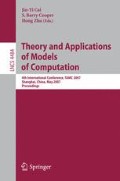Abstract
This paper first explores the power of the dial locks (also called the combination locks), which are physical handy devices, in designing cryptographic protocols. Specifically, we design protocols for secure multiparty computations using the dial locks, and give some conditions for a Boolean function to be or not to be securely computable by a dial lock, i.e., to be or not to be “dial-computable.” In particular, we exhibit simple necessary and sufficient conditions for a symmetric function to be dial-computable.
Access this chapter
Tax calculation will be finalised at checkout
Purchases are for personal use only
Preview
Unable to display preview. Download preview PDF.
References
Albert, M.H., et al.: Safe communication for card players by combinatorial designs for two-step protocols. Australasian Journal of Combinatorics 33, 33–46 (2005)
Balogh, J., et al.: Private computation using a PEZ dispenser. Theoretical Computer Science 306, 69–84 (2003)
den Boer, B.: More efficient match-making and satisfiability: the five card trick. In: Quisquater, J.-J., Vandewalle, J. (eds.) EUROCRYPT 1989. LNCS, vol. 434, pp. 208–217. Springer, Heidelberg (1990)
Clote, P., Kranakis, E.: Boolean Functions and Computation Models. Springer, Heidelberg (2002)
Crépeau, C., Kilian, J.: Discreet solitary games. In: Stinson, D.R. (ed.) CRYPTO 1993. LNCS, vol. 773, pp. 319–330. Springer, Heidelberg (1994)
Fagin, R., Naor, M., Winkler, P.: Comparing information without leaking it. Communications of the ACM 39(5), 77–85 (1996)
Fischer, M.J., Wright, R.N.: Bounds on secret key exchange using a random deal of cards. Journal of Cryptology 9, 71–99 (1996)
Goldreich, O.: Foundations of Cryptography II: Basic Applications. Cambridge University Press, Cambridge (2004)
Mizuki, T., Otagiri, T., Sone, H.: Secure computations in a minimal model using multiple-valued ESOP expressions. In: Cai, J.-Y., Cooper, S.B., Li, A. (eds.) TAMC 2006. LNCS, vol. 3959, pp. 547–554. Springer, Heidelberg (2006)
Mizuki, T., Shizuya, H., Nishizeki, T.: Characterization of optimal key set protocols. Discrete Applied Mathematics 131(1), 213–236 (2003)
Moran, T., Naor, M.: Basing cryptographic protocols on tamper-evident seals. In: Caires, L., et al. (eds.) ICALP 2005. LNCS, vol. 3580, pp. 285–297. Springer, Heidelberg (2005)
Moran, T., Naor, M.: Polling with physical envelopes: a rigorous analysis of a human-centric protocol. In: Vaudenay, S. (ed.) EUROCRYPT 2006. LNCS, vol. 4004, pp. 88–108. Springer, Heidelberg (2006)
Niemi, V., Renvall, A.: Secure multiparty computations without computers. Theoretical Computer Science 191, 173–183 (1998)
Salomaa, A.: Caesar and DNA. Views on cryptology. In: Ciobanu, G., Păun, G. (eds.) FCT 1999. LNCS, vol. 1684, pp. 39–53. Springer, Heidelberg (1999)
Salomaa, A.: Public-Key Cryptography, 2nd Enlarged edn. Springer, New York (1996)
Sasao, T.: Switching Theory for Logic Synthesis. Kluwer Academic Publishers, Boston (1999)
Stiglic, A.: Computations with a deck of cards. Theoretical Computer Science 259, 671–678 (2001)
Vollmer, H.: Introduction to Circuit Complexity. Springer, Heidelberg (1999)
Author information
Authors and Affiliations
Editor information
Rights and permissions
Copyright information
© 2007 Springer-Verlag Berlin Heidelberg
About this paper
Cite this paper
Mizuki, T., Kugimoto, Y., Sone, H. (2007). Secure Multiparty Computations Using a Dial Lock. In: Cai, JY., Cooper, S.B., Zhu, H. (eds) Theory and Applications of Models of Computation. TAMC 2007. Lecture Notes in Computer Science, vol 4484. Springer, Berlin, Heidelberg. https://doi.org/10.1007/978-3-540-72504-6_45
Download citation
DOI: https://doi.org/10.1007/978-3-540-72504-6_45
Publisher Name: Springer, Berlin, Heidelberg
Print ISBN: 978-3-540-72503-9
Online ISBN: 978-3-540-72504-6
eBook Packages: Computer ScienceComputer Science (R0)

